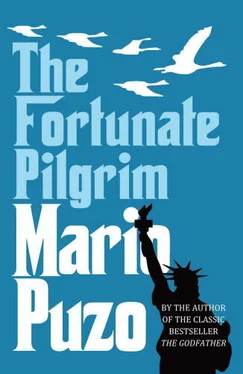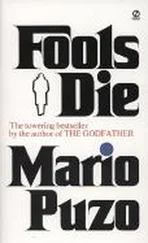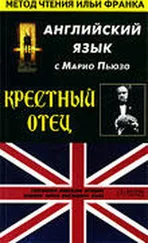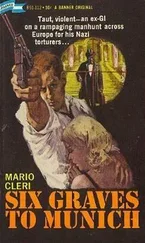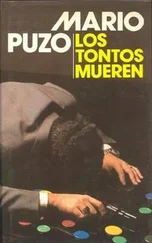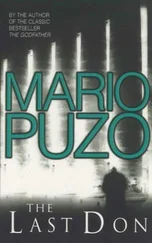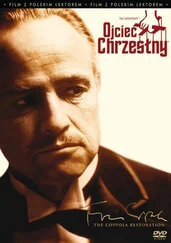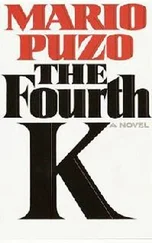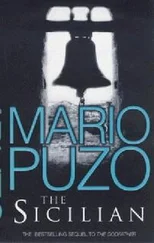That was the climax; the old crone went on to other things, leaving him bewildered and watching his mother’s face go pale and her eyes turn red. She would reach down to touch him, but she never spoke.
Down in the street Vincent saw his sister Octavia get up to look at the baby. He hated her, too. She had betrayed him. She had not protested their mother’s sending him to work. Then the dummy boy rode under the bridge, and Vincent saw his brother Larry riding like a real cowboy on a black horse.
Even from so far up he could hear a loud clatter of hoofs on cobblestones. The children disappeared and the bridge vanished in a cloud of steam from the engine. With a great shower of sparks, the train slid into the railroad yards.
It was late. The night air had cooled the city. His mother and the other women picked up their stools and crates, called to husbands and children. His stepfather wheeled the baby to the tenement door. It was time to get ready for bed.
Vincent left his window sill and went back through the bedrooms to the kitchen. He unlocked the door to the hallway, opening the house for his family. Then he took the thigh-sized loaf of Italian bread and sliced off three thick, crusty chunks. Over these he poured red wine vinegar, then thick, yellow-green olive oil. He stood back and scattered salt over all three, inspecting them with a satisfied air. The coarse bread was a lovely red dotted with blots of greasy green. Gino and Sal would be delighted with this bedtime snack. They would all eat together. He waited. From the street, through windows still open and coming down the corridor of rooms between, he heard Gino’s voice in a loud continuous scream.
That scream froze Lucia Santa with the baby in her arms. Octavia, on the corner of 30th Street, turned toward 31st. Across the Avenue Larry wheeled around on his horse. The father, his temples bursting with fear, started to run and curse. But the child’s scream was one of hysterical triumph. Gino had shot out of the darkness and circled his enemies and was screaming, “Burn the city, burn the city.” So ending the game, he could not stop screaming the magic words or stop running. He aimed himself at his mother’s enormous menacing figure with great leaps into the air, remembered his insult to Zia Louche, and swerved away, through the door and up the stairs.
Lucia Santa, with every intention of striking him to the ground, stood overwhelmed by a fierce pride and tenderness at her child’s wild joy, the spirit that she must someday break. She let him pass unharmed.
The Neapolitan Italians dissolved from the dark streets and left the city to the clatter of hoofs on cobblestones as Larry Angeluzzi galloped his horse to the stable on 35th Street.
CHAPTER 2

THE ANGELUZZI-CORBO family lived in the best tenement on Tenth Avenue. There was only one apartment to each of the four flights so windows opened to the west on Tenth Avenue and to the east on the backyards, giving cross-ventilation. The Angeluzzi-Corbos, by having the whole floor—and the top floor at that—were able to use the back of the hallway for extra storage space. The icebox, a bureau, countless cans of tomato paste, and boxes of macaroni were stacked against the wall, for though the apartment consisted of six rooms, they were crowded for space.
The apartment was shaped like a long E with the middle prong missing. The kitchen formed the lower shelf; then the dining room, the bedrooms and the living room, with its windows facing on Tenth Avenue, made the long vertical line; and Octavia’s small, doored bedroom off the living room was the top prong of the E. Gino, Vinnie, and Sal slept in the living room on a bed that folded up into an upright dolly. This was put in a corner during the day and covered with a made-over drapery. The parents slept in the bedroom first on the line, and Larry in the next one. Then came the dining room, which was called the kitchen—it had a great wooden table, for eating and living—and at right angles to that was the real kitchen, with its boiler, sink, and stove. By the standards of the neighborhood, the apartment was wastefully commodious, and an example of Lucia Santa’s unthriftiness.
OCTAVIA PUT BABY Aileen on her mother’s bed and went into her own room to change into a house dress. When she came out the three boys were already sound asleep, their great bed having been unfolded onto the middle of the living room floor. She went down the corridor of rooms to the kitchen to wash her face. Her mother sat in the dining room, waiting, sipping a small glass of wine. Octavia knew her mother would stay up to finish their quarrel and that afterward, like conspirators, they would make plans together for the family’s fortune—a house on Long Island, college for the brightest child.
Lucia Santa began with intended conciliation, saying in Italian, “The baker’s son, he has his eye on you. Does he give you ices to make sure you won’t speak to him?” She enjoyed her irony, but paused to listen intently at a sound from the bedroom. She asked worriedly, “Did you put Lena in the middle of the bed? She won’t roll off?”
Octavia was furious. She could forgive the deliberate teasing, though her mother knew her aversion to the young men of the neighborhood. But she herself had given her little half sister the name Aileen. After long consideration Lucia Santa had consented. It was time to be American. But the name could not be said by an Italian tongue. Impossible. And so it had been shortened to the familiar Lena. Lucia Santa, after some valiant tries to please her daughter, one day lost her temper and shouted in Italian, “That is not even American.” And so the baby was Lena to everyone except the other children of the family. Octavia’s hand was in their face when they took such liberties.
Mother and daughter prepared for battle. Octavia patted her curls, then took her fingernail kit from a shelf in the kitchen. She said in meticulous, contemptuous English, “I’ll never marry one of these guineas. They just want a woman they can treat like a dog. I don’t want what you had in your life.” She began an elaborate operation on her nails. She would paint them tonight. It would annoy her mother.
Lucia Santa watched her daughter with exaggerated operatic calm, letting her breath go short and heavy. They resembled each other very much in anger—black liquid eyes flashing; full, sensuous features deadened with rage and sullenness. But when the mother spoke, her voice was reasonable.
“Ah,” she said. “This is how a daughter speaks to her mother in America? Brava. You would make a fine schoolteacher.” She bowed her head coolly to her daughter. “ Mi, mi dispiace. I, I don’t care for it.” And the young girl knew that another such insolence would bring her mother upon her like a cat, hand open in her face. Octavia was not afraid, but she was dutiful within reason; and she knew that her mother, the family chief, leaned heavily on her, respected her, would never side with the outside world against her. She felt guilt at her disloyalty because she thought her mother’s life a waste.
Octavia smiled to make her words less cruel. She said, “I just meant I don’t want to get married or have children if I do. I don’t want to give up my whole life just for that. ” In the last word she expressed her contempt and also her hidden fear of what she did not know. Lucia Santa looked her American daughter up and down. “Ah,” she said, “poor child of mine.” Octavia grew hot with a rush of blood and was silent. The mother thought of something else, rose, went into the bedroom, and returned with two five-dollar bills in the postal savings book. “Here, quick—put it in your dress before your father and brother come. Bring it to the post office tomorrow at work.”
Читать дальше
